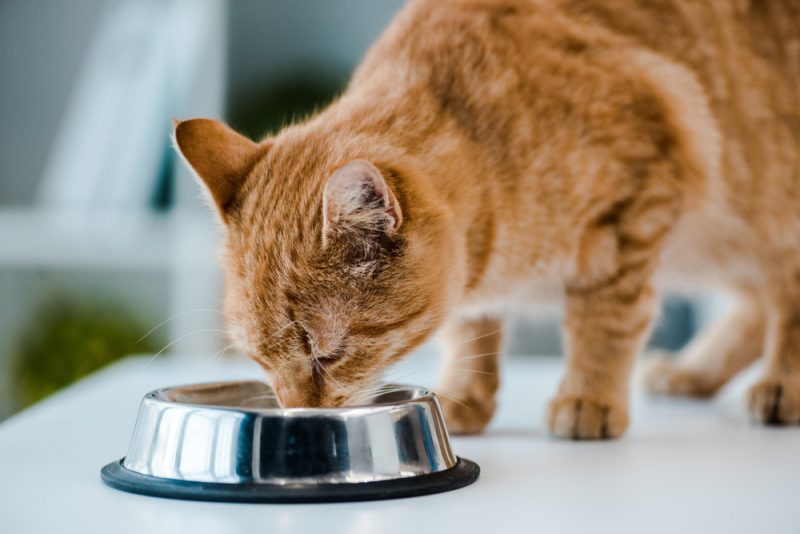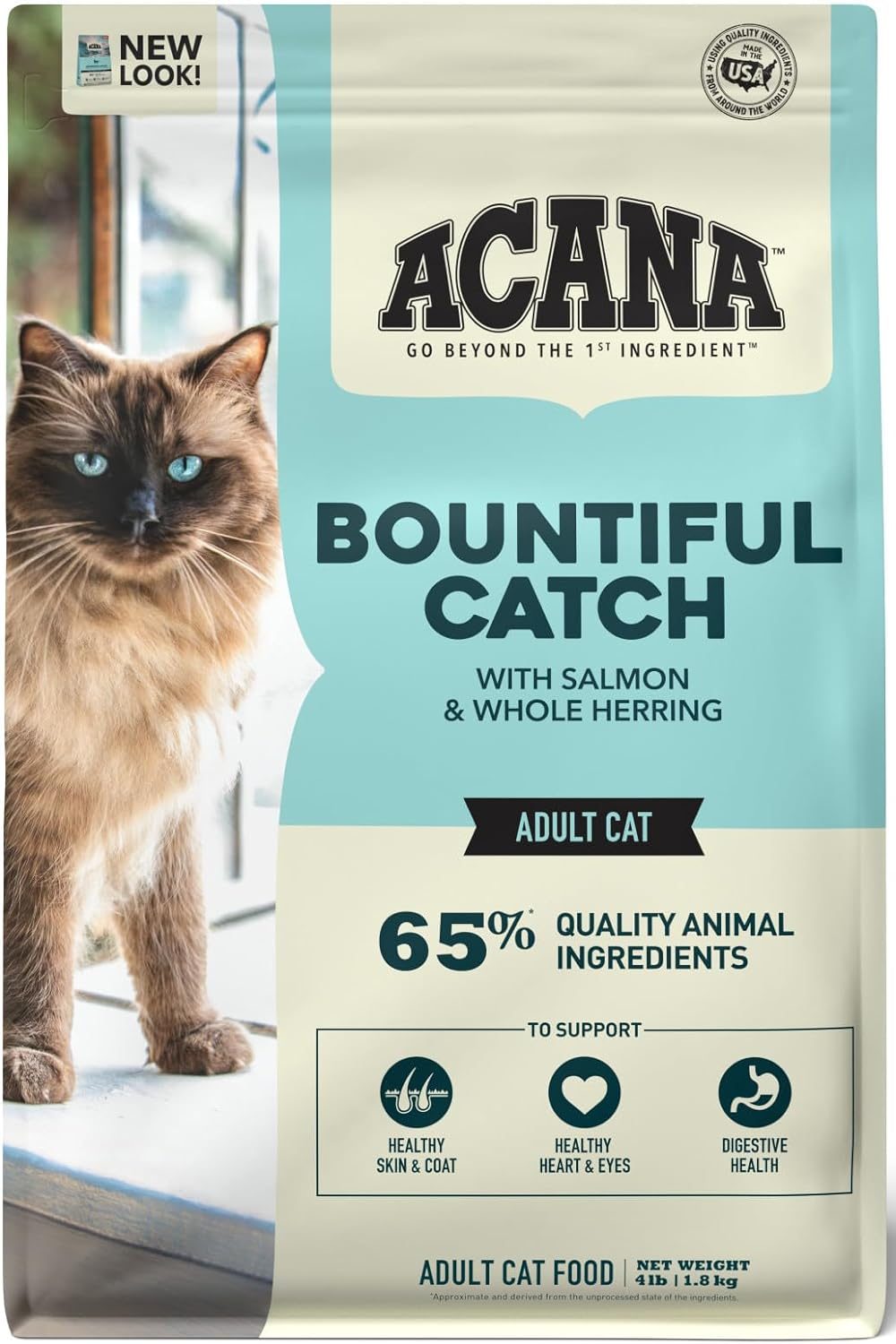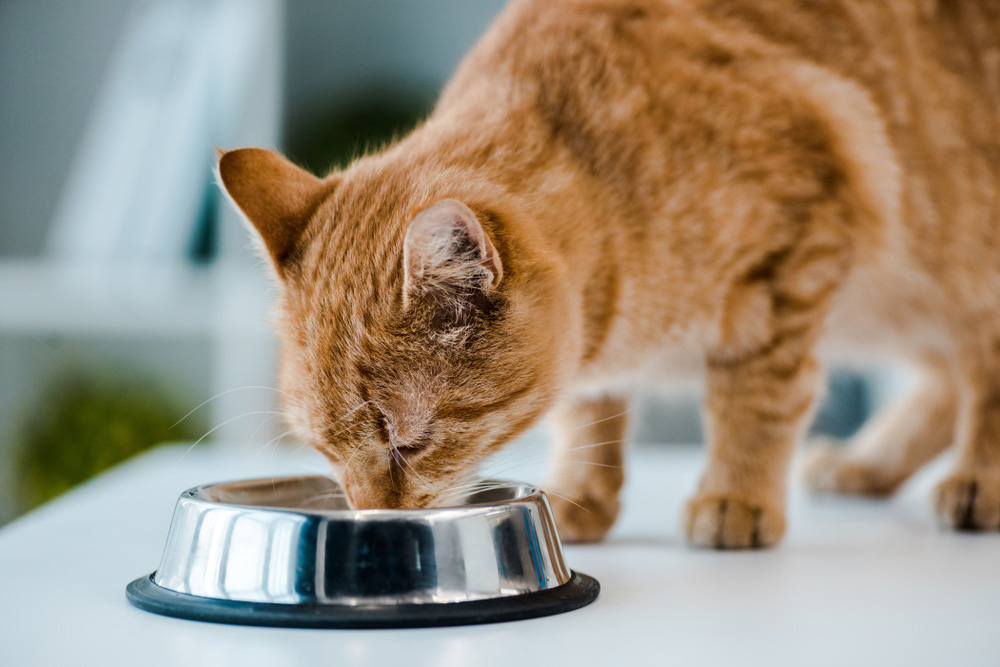
When shopping for cat food for cats with allergies, it’s helpful to look for foods that use limited ingredients. The food should also incorporate natural whole foods rather than ambiguous ingredients, like artificial flavors and animal by-product meals.
Fortunately, you can find many more kinds of cat food than you could in the past. While the search can feel overwhelming, there’s a good chance that you’ll find a recipe that’s palatable and safe for your cat. Our reviews will provide all the essential information you need on the best cat foods for cats with allergies and help you determine which ones your cat would enjoy.
A Quick Comparison of Our Favorites in 2024
| Image | Product | Details | ||
|---|---|---|---|---|
| Best Overall |
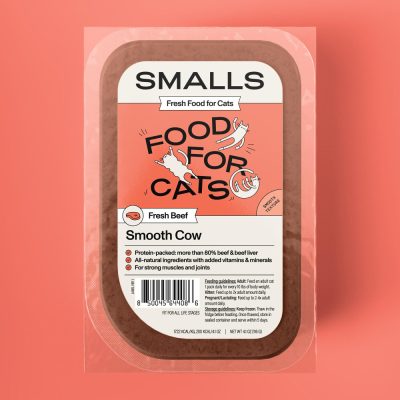
|
Smalls Fresh Smooth Cow |
|
CHECK PRICE |
| Budget Buy |
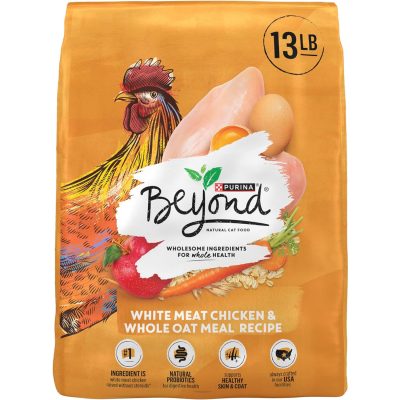
|
Purina Beyond Simply White Meat Chicken & Whole Oatmeal Recipe Dry Cat |
|
CHECK PRICE |
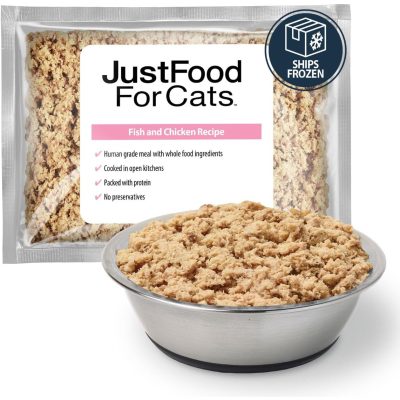
|
JustFoodForDogs Fish & Chicken Recipe Frozen Human-Grade |
|
CHECK PRICE | |
| Best for Kittens |
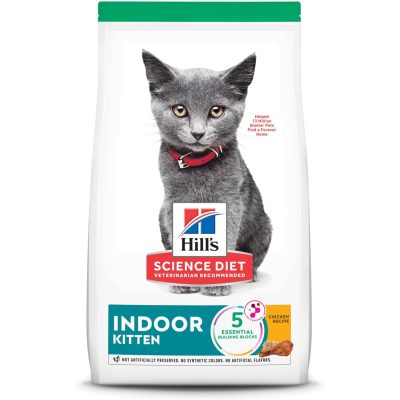
|
Hill’s Science Diet Indoor Kitten Dry Cat Food |
|
CHECK PRICE |
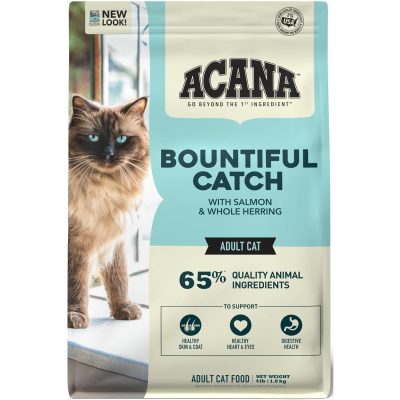
|
ACANA Bountiful Catch High-Protein Adult Dry Cat Food |
|
CHECK PRICE |
The 10 Best Cat Foods for Cats With Allergies
1. Smalls Fresh Smooth Cow – Best Overall
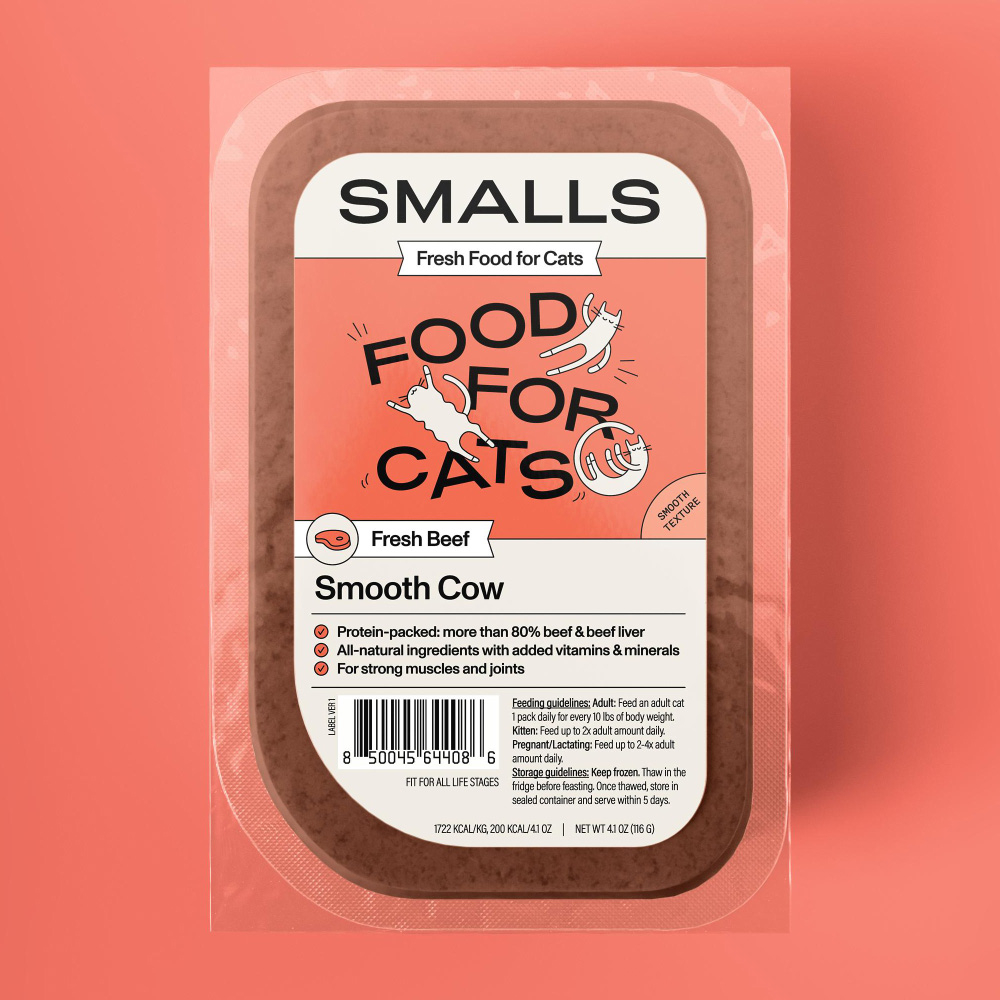
| Main ingredients: | Beef, beef liver, green beans, water, spinach |
| Protein content: | 51.60% |
| Fat content: | 37.50% |
| Calories: | 1714 kcal/kg |
Smalls is a fresh cat food brand that produces high-quality human-grade cat food that any cat would love to eat. The Fresh Smooth Cow recipe’s ingredient list is simple yet nutritious, making it the best cat food for cats with allergies. It only uses beef as its single-source protein, so it’s a safe option for cats with chicken allergies. It also contains other natural whole foods like spinach and peas.
This recipe is suitable for cats of all ages. So, if you have a kitten with food sensitivities and it can eat this meal, you don’t have to worry about transitioning it to a new food as it matures. The only thing to watch out for is if your cat has urinary tract issues, as spinach is one of the main ingredients in this recipe. Spinach contains calcium oxalates, which can contribute to the formation of bladder stones.1
- Chicken-free
- Simple and nutritious ingredient list
- Suitable for all life stages
- May not be for cats with urinary tract issues
2. Purina Beyond Simply White Meat Chicken & Whole Oatmeal Recipe Dry Cat Food – Budget Buy
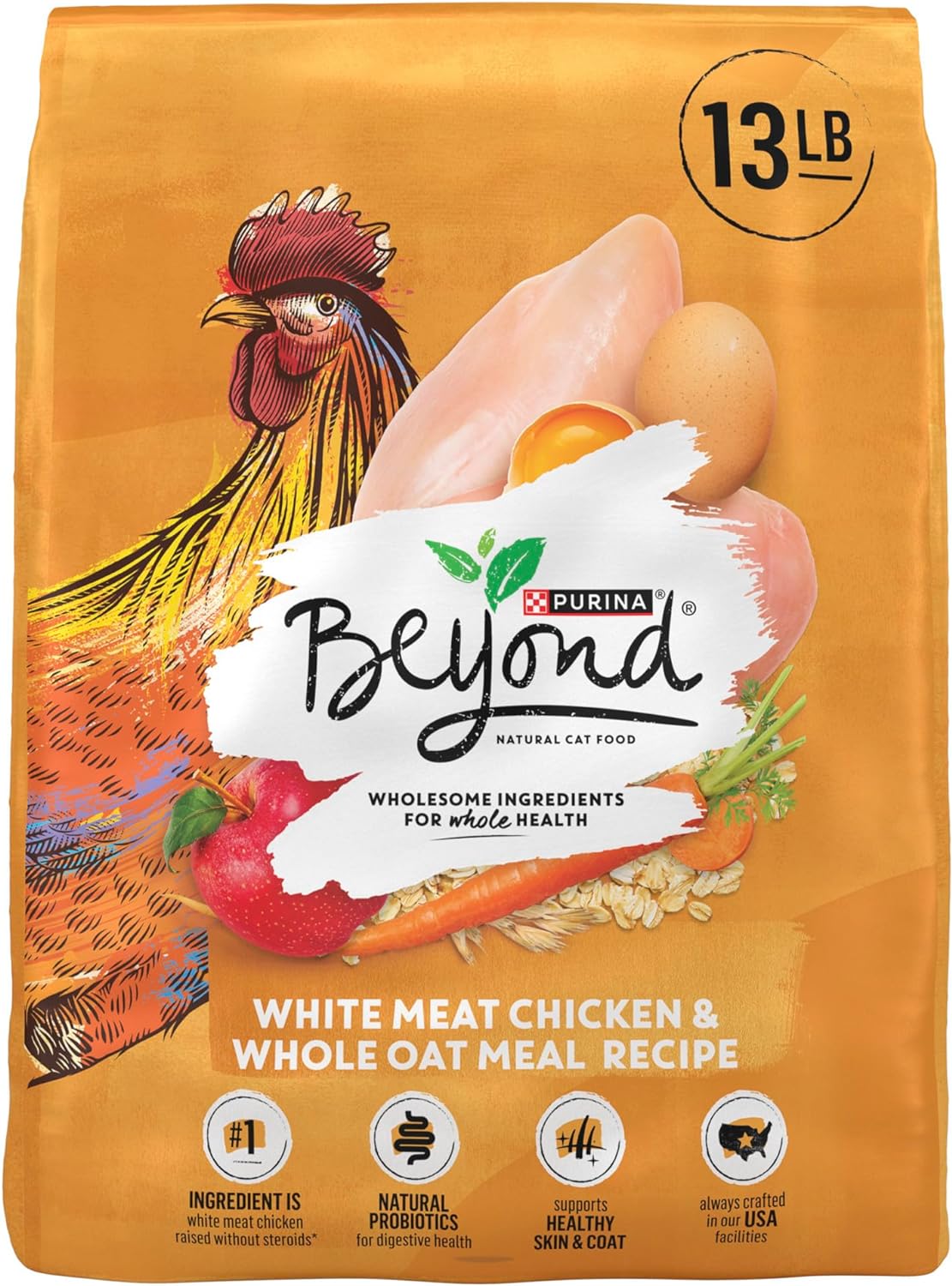
| Main ingredients: | Chicken, chicken meal, whole barley, rice, whole oatmeal |
| Protein content: | 33% |
| Fat content: | 15% |
| Calories: | 411 kcal/cup |
If you’re looking for a budget-friendly option, Purina Beyond Simply White Meat Chicken & Whole Oatmeal Recipe is the best cat food for cats with allergies for the money without heavily compromising quality. This limited-ingredient recipe mainly consists of chicken, but it does contain some dried egg product. So, as long as your cat doesn’t have egg allergies, it should be able to eat this food safely.
The recipe is free of artificial flavors or colors and is a good option for cats with sensitive stomachs because it contains easily digestible ingredients. It’s also manufactured in facilities that use earth-friendly practices and is a considerable option if you’re looking to take a step toward shopping more consciously.
- Limited-ingredient recipe with easily digestible ingredients
- No artificial flavors or colors
- Manufactured in facilities using earth-friendly practices
- Not for cats with egg allergies
3. JustFoodForDogs Fish & Chicken Recipe Frozen Human-Grade Fresh Cat Food
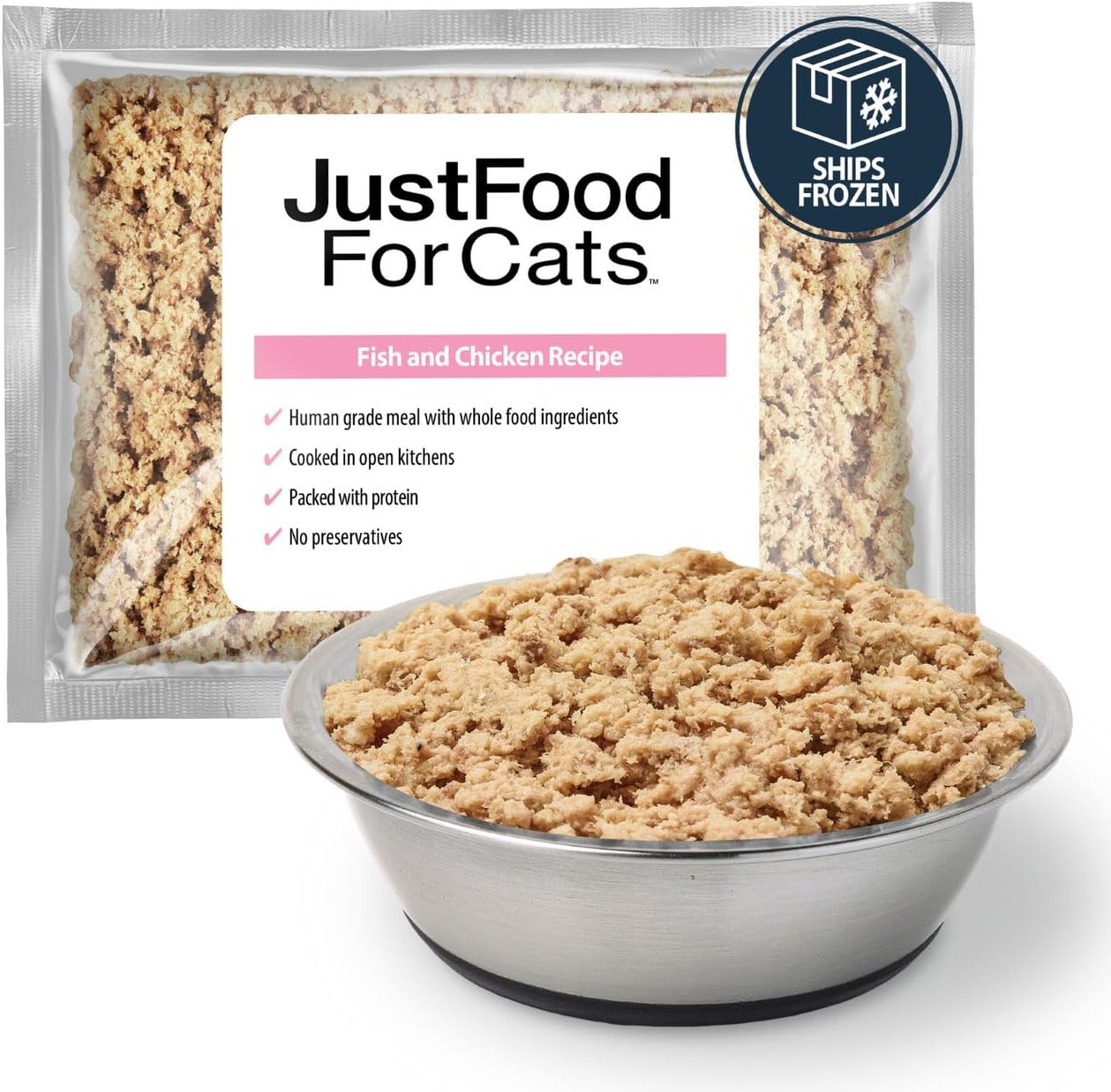
| Main ingredients: | Cod, chicken, chicken heart, chicken liver, cassava root |
| Protein content: | 46.20% |
| Fat content: | 17.30% |
| Calories: | 42 kcal ME/oz |
While JustFoodForDogs is a brand that makes mostly dog food, it does have a high-quality cat food recipe that’s a good option for cats allergic to beef. This cat food is made fresh with human-grade ingredients and contains a savory blend of cod, chicken, and sardines. It has an extremely clean ingredient list that omits artificial flavors, preservatives, growth hormones, BHA, or BHT. The recipe was also formulated by veterinarians and backed by science and independent research. It has a relatively long shelf life and can be stored in the freezer for up to a year. However, the food has to be eaten within 3 days once opened, so it may be a bit of a challenge for smaller cats to finish a pouch of food.
- Safe for cats with beef allergies
- Clean ingredient list
- Can be stored frozen for up to 1 year
- Has to be eaten within 3 days
4. Hill’s Science Diet Indoor Kitten Dry Cat Food – Best for Kittens
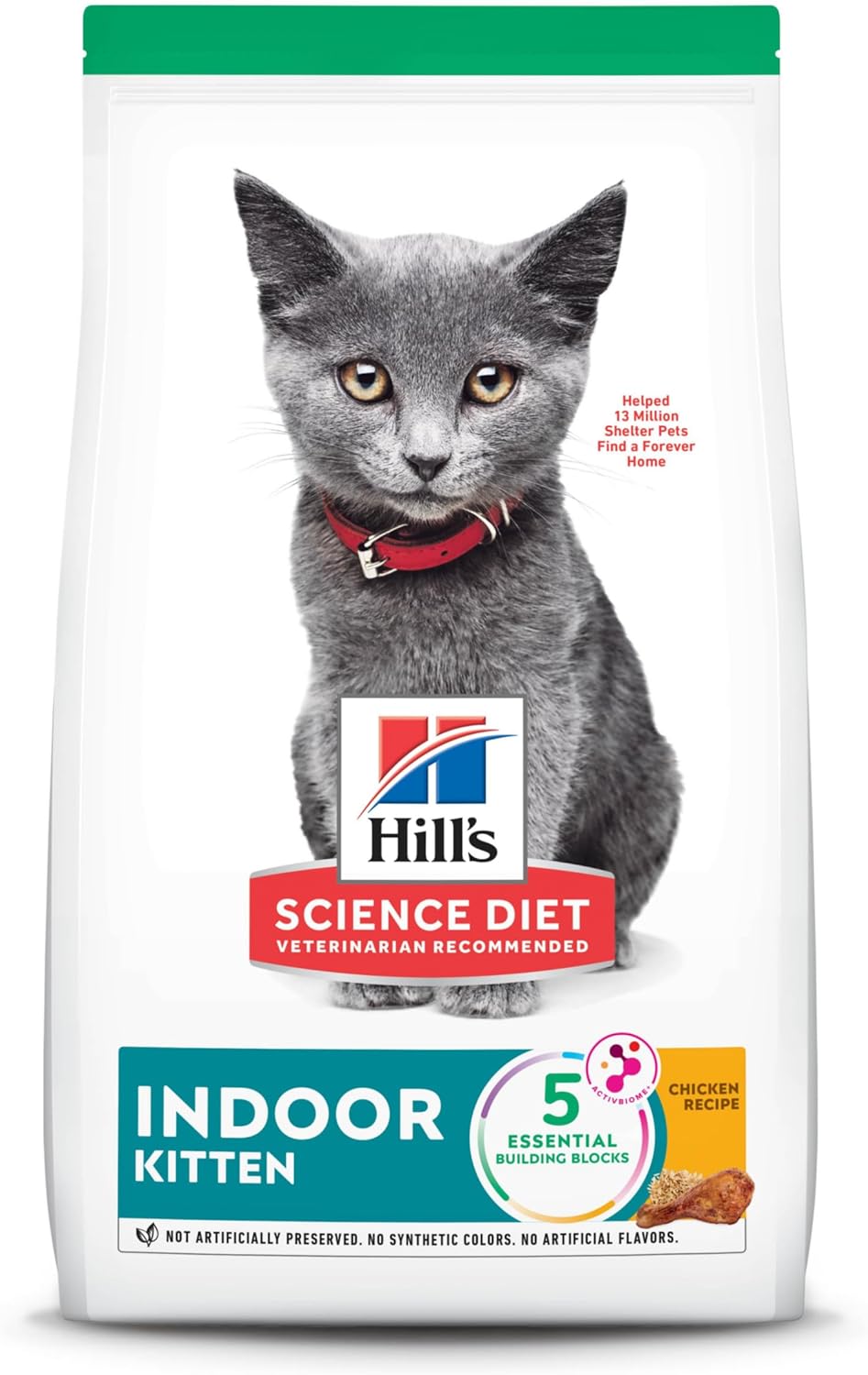
| Main ingredients: |
Chicken, wheat gluten, brown rice, chicken fat, whole grain oats
|
| Protein content: | 33.50% |
| Fat content: | 16.50% |
| Calories: | 544 kcal/cup |
Finding the right cat food for kittens is especially important because diet and nutrition play an essential role in growth and development. Having allergies can severely limit options, but you can still find some high-quality options, like Hill’s Science Diet Indoor Kitten Dry Cat Food.
This recipe contains natural, nutritious ingredients and is a safe option for cats allergic to beef. It contains fish oil, which helps nourish and moisturize dry and irritated skin, and DHA, an omega-3 fatty acid that aids in healthy brain and eye development. The formula also incorporates a nutritious blend of antioxidants and vitamins to support the immune system.
Overall, this cat food has a high-quality recipe. So, even though it may be more expensive than other types of cat food, you’ll definitely be getting your money’s worth and feeding your kitten a nutritious meal.
- Safe for kittens with beef allergies
- Formula nourishes skin and coat
- Formula supports immune system
- Relatively expensive
5. ACANA Bountiful Catch High-Protein Adult Dry Cat Food
| Main ingredients: | Salmon, salmon meal, catfish meal, oatmeal, whole peas |
| Protein content: | 33% |
| Fat content: | 16% |
| Calories: | 433 kcal/cup |
This ACANA cat food omits many common food allergens for cats, like chicken, beef, and eggs. Instead, it contains a savory combination of fish, including salmon, herring, catfish, and trout. It’s balanced with omega-3 and omega-6 fatty acids to nourish the skin and coat, which can be especially helpful if your cat’s allergies cause skin inflammation and irritation. It’s also a good source of DHA, EPA, and taurine, which support eye and heart health.
While this cat food has a relatively clean ingredient list, it does contain lentils. Most cats can safely eat cooked lentils in small quantities. However, some cats with especially sensitive stomachs may have difficulty digesting it and can end up getting an upset stomach.
- Omits several common food allergens
- Formula nourishes skin and coat
- Has clean ingredient list
- Lentils can cause upset stomach
6. Castor & Pollux ORGANIX Organic Turkey, Brown Rice & Chicken Recipe
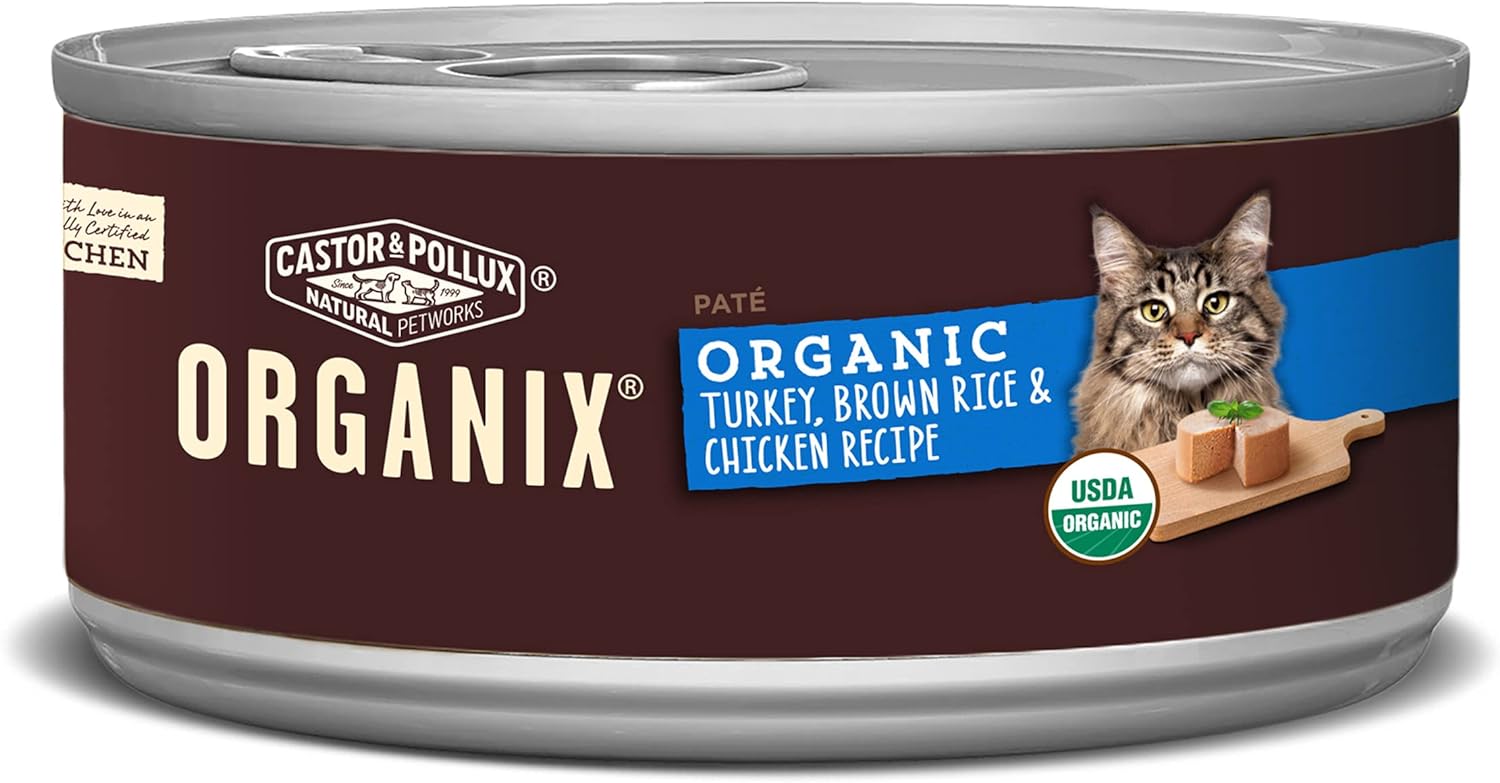
| Main ingredients: |
Organic turkey, water sufficient for processing, organic brown rice, organic chicken, organic chicken liver
|
| Protein content: | 36.40% |
| Fat content: | 27.30% |
| Calories: | 105 kcal/3-oz can |
Though Castor & Pollux ORGANIX is a brand that produces some of the most expensive cat food, it’s difficult to find options that surpass its quality. This particular recipe is USDA-certified organic and has organic free-range turkey as the first ingredient. It only contains natural ingredients and a blend of vitamins and minerals to provide a complete and balanced meal for cats of all life stages.
The formula contains omega-3 and omega-6 fatty acids to nourish and revitalize the skin and coat. The smooth consistency of this pate is also easy for kittens and older cats to eat. It supports healthy digestion, and the high-moisture content can also help keep your cat hydrated.
- Certified-USDA organic
- Organic free-range turkey is first ingredient
- Only contains natural ingredients
- Suitable for cats of all life stages
- Relatively expensive
7. Wellness Complete Health Salmon Adult Dry Cat Food
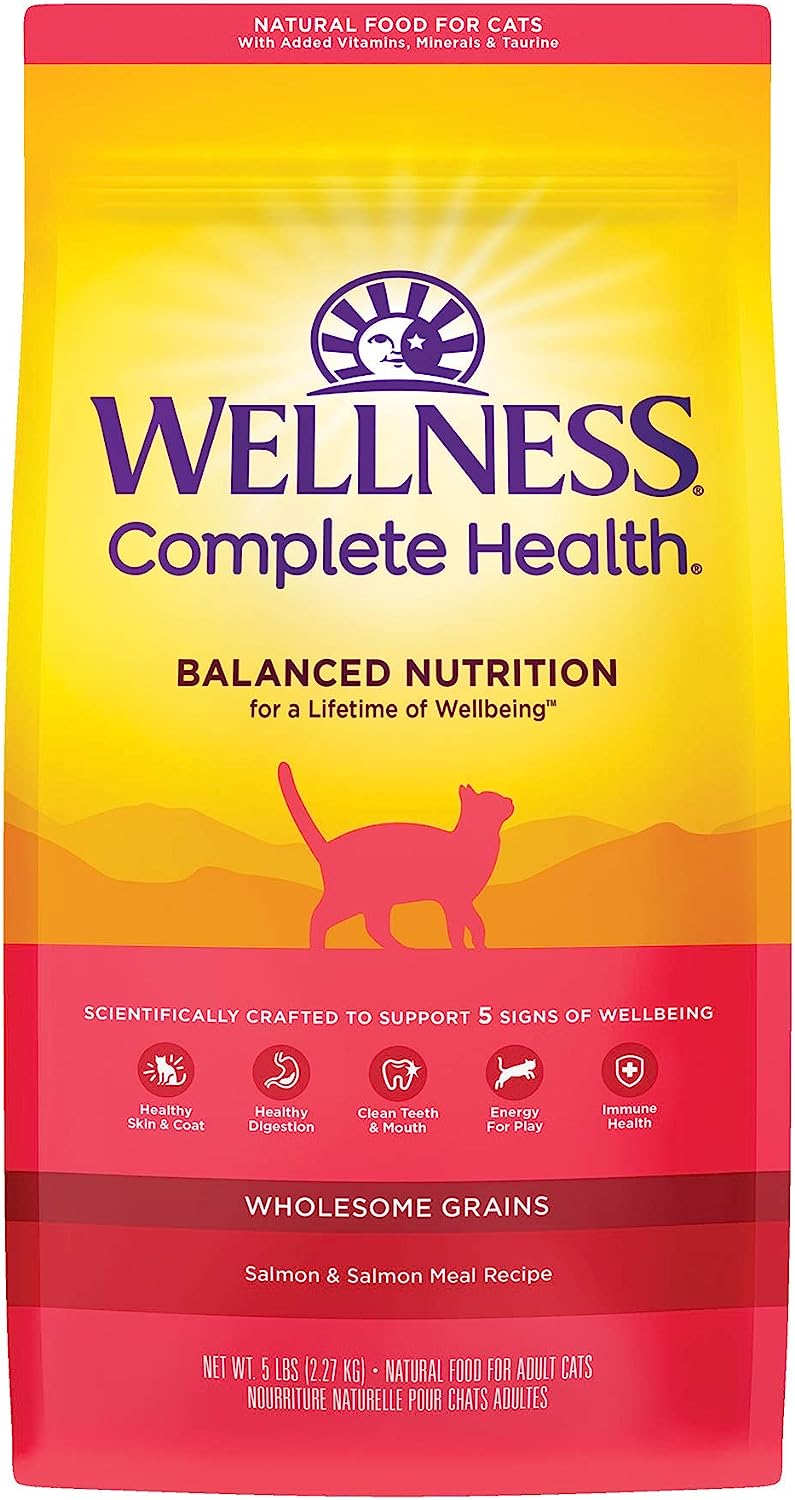
| Main ingredients: |
Salmon, salmon meal, herring meal, menhaden fish meal, rice
|
| Protein content: | 36% |
| Fat content: | 18% |
| Calories: | 472 kcal/cup ME |
This fish-based cat food is another considerable option for cats with beef or egg allergies. It does contain some chicken fat, but cats are usually allergic to proteins found in chicken. So, they may not be affected by eating small amounts of chicken fat.
The recipe is made with non-GMO ingredients and is packed with essential vitamins, minerals, and omega fatty acids. The formula promotes skin and coat health and good digestion, and strengthens the immune system. It’s an overall well-balanced meal for adult cats with a clean and high-quality ingredient list.
- No beef or eggs
- Made with non-GMO ingredients
- Supports skin and coat health
- Supports immune system health
- Contains small amounts of chicken fat
8. Halo Holistic Wild-Caught Whitefish Recipe Sensitive Stomach Support Adult Dry Cat Food
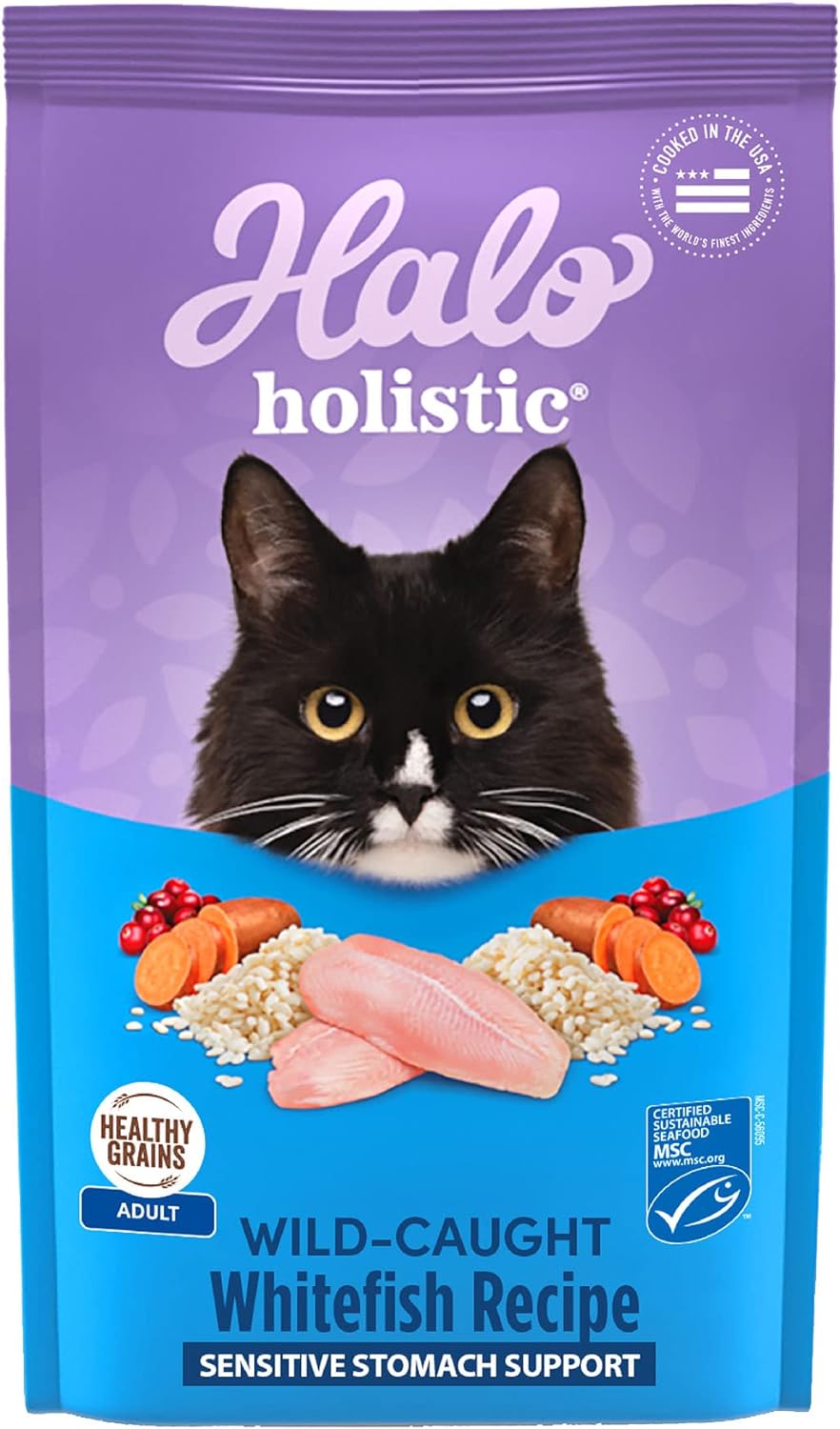
| Main ingredients: | Whitefish, brewers rice, pork, brewers dried yeast, pork fat |
| Protein content: | 32% |
| Fat content: | 16% |
| Calories: | 447 kcal/cup |
This recipe developed by Halo has a sensitive skin and stomach formula that can be extremely beneficial for cats with food or environmental allergies. It omits common food allergens, like beef, chicken, and eggs. However, it does contain a small amount of whey. While wheat allergies are rare in cats, whey protein can cause an allergic reaction in cats with a wheat allergy.
The ingredient list has whitefish and pork as its main protein sources. It’s enriched with omega fatty acids, which can help cats prone to skin irritation and inflammation caused by allergic reactions. It also incorporates many other natural nutrient-dense foods, like cranberries and sweet potatoes.
- Sensitive skin and coat formula
- Omits several common food allergens
- Uses all-natural ingredients
- Contains a small amount of whey
9. Purina Pro Plan Veterinary Diets HA Hydrolyzed Dry Cat Food
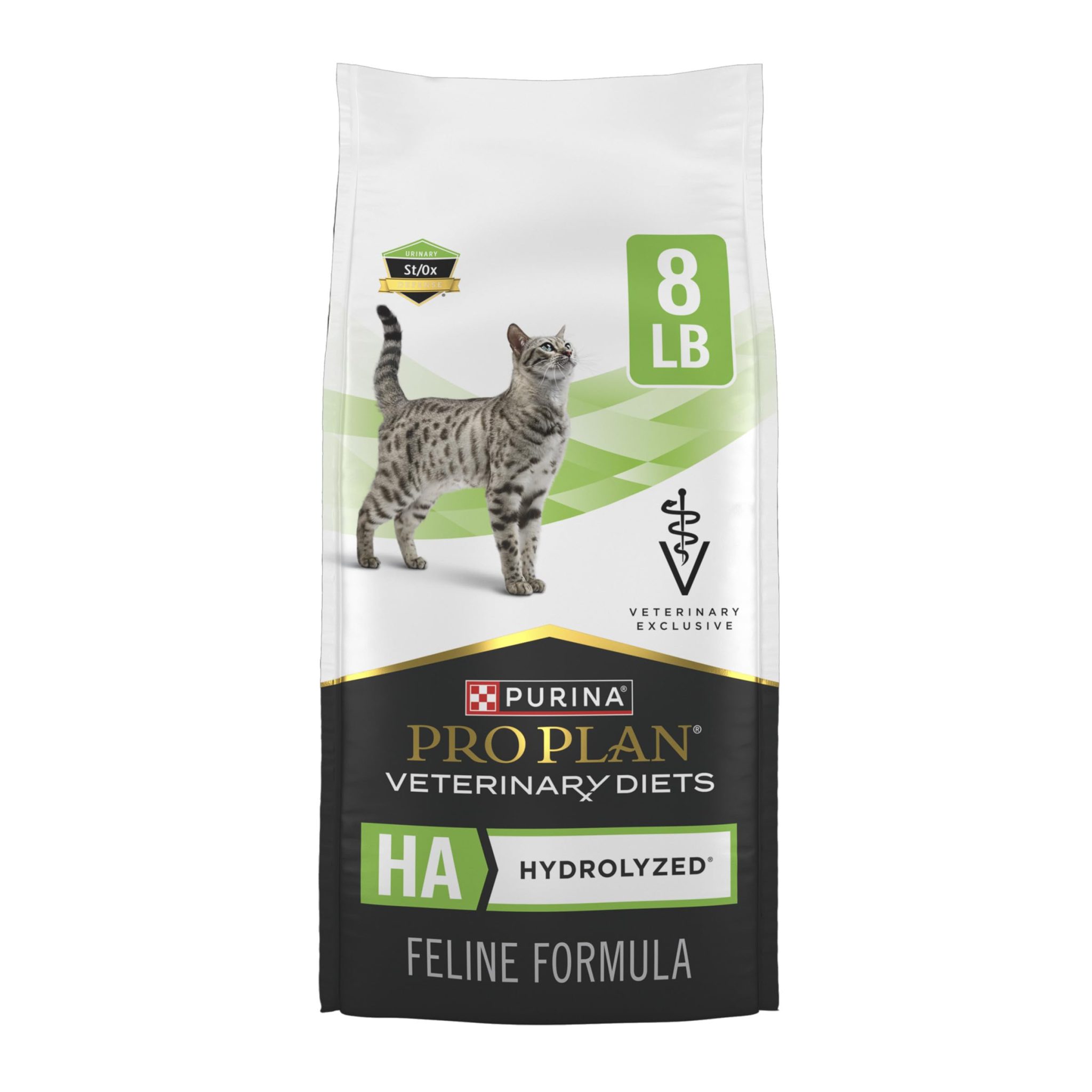
| Main ingredients: |
Rice starch, hydrolyzed soy protein isolate, partially hydrogenated canola oil preserved with TBHQ, hydrolyzed chicken liver, tricalcium phosphate
|
| Protein content: | 30% |
| Fat content: | 9% |
| Calories: | 323 kcal/cup |
Some cats with severe allergies may benefit from eating a prescription hydrolyzed diet. These diets are relatively expensive and aren’t as accessible as regular cat food because they must be prescribed by your veterinarian. However, they can help your cat find gastrointestinal relief caused by food sensitivities.
The formula is specifically intended to help cats with food-related gastroenteritis or dermatitis. The recipe contains a single hydrolyzed protein source, which is highly digestible and less likely to cause allergic reactions. It also uses a low-allergen carbohydrate that doesn’t require energy for cats to absorb or store it. The rest of the ingredient list contains highly specifickt ingredients that are meant to prevent triggering allergies.
- Formulated for cats with dermatitis or gastroenteritis
- Highly digestible
- Uses low-allergen protein and carbohydrate sources
- Relatively expensive
- Requires veterinarian prescription
10. Lucy Pet Products kettle Creations Sardine & Tuna Recipe in Gravy Wet Cat Food
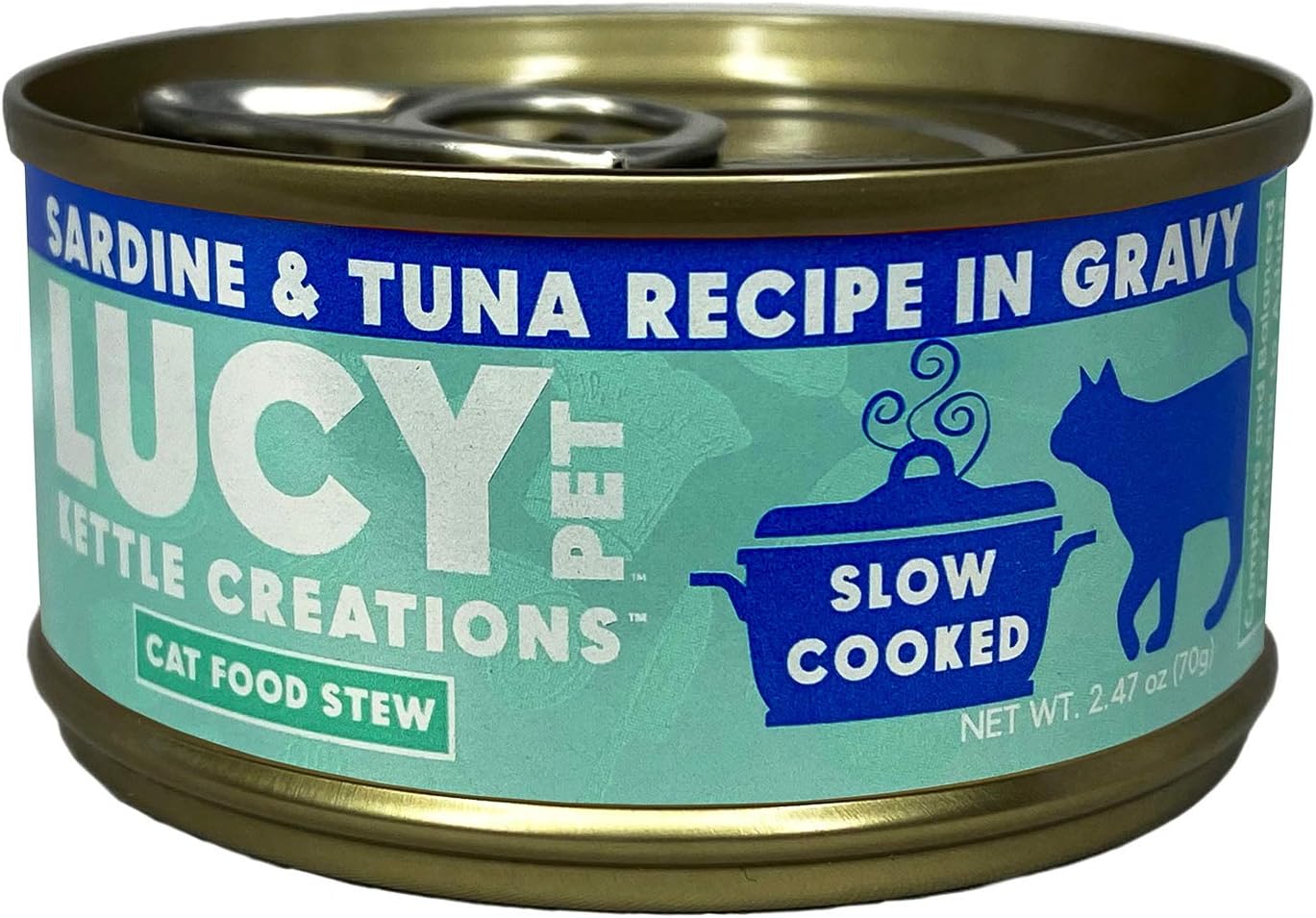
| Main ingredients: | Fish broth, sardine, tuna, pumpkin, brown rice |
| Protein content: | 50% |
| Fat content: | 12.50% |
| Calories: | 52 kcal/can |
This cat food is another limited-ingredient cat food that’s suitable for cats of all ages. It’s made with sardine and tuna and includes easily digestible ingredients, like pumpkin. It doesn’t contain any chicken, beef, or eggs. The food is prepared in small batches to ensure every batch meets quality control standards and promotes nutrient retention.
While this cat food meets nutritional requirements for all life stages, it may be a little difficult for some senior cats to eat. They’ll have an easy time lapping up the gravy, but the pieces of food may be too big for them if they have dental issues or have had some tooth extractions.
- Suitable for all life stages
- Omits several common food allergens
- Made in small batches for quality control purposes
- Pieces of food can be too big for some senior cats
Buyer’s Guide: Selecting the Best Cat Food for Cats With Allergies
Buying food for cats with allergies can be extra challenging because of the extra considerations. However, the search can be less intimidating or overwhelming if you focus on several key factors. Here are some things to keep in mind while shopping for cat food for cats with allergies.
Common Food Allergens
If you’re unsure exactly what foods your cat’s allergic or sensitive to, it’s helpful to avoid common food allergens for cats. The most common food allergens for cats are beef, chicken, fish, and dairy. It’s important to note that cats develop allergies to foods they’ve already been exposed to. So, you can try feeding your cat recipes that use novelty meats, like duck, lamb, or venison.
Natural Whole Food
When shopping for new cat food, make sure to check the ingredient list. High-quality cat food that uses natural foods is less likely to trigger allergies. Avoid foods with ambiguous ingredients, like poultry by-product meal and artificial flavors, because it’s unclear exactly what’s inside them.
If you know that your cat has a sensitive stomach, look for recipes that only contain easily digestible ingredients. Cats with sensitive stomachs can have difficulty digesting certain types of grains and vegetables, such as beans and lentils.
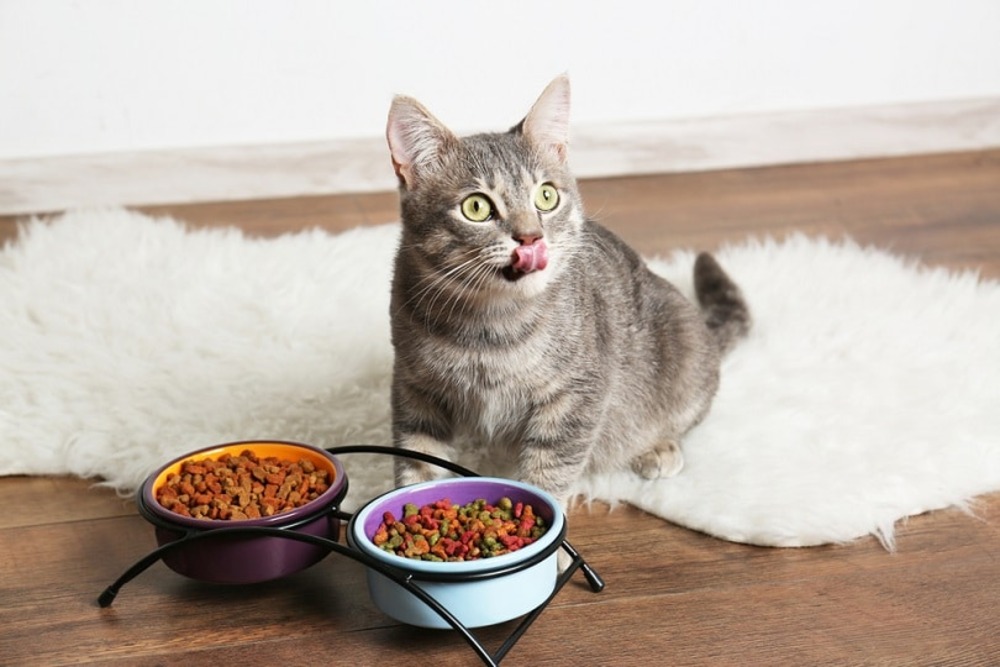
Specialty Diets
Some specialty diets are worth exploring. Limited-ingredient diets and sensitive skin and coat formulas are two types of specialty diets that can be helpful for cats with allergies. Limited-ingredient diets are especially helpful for cats with food allergies because you can easily avoid feeding your cat certain foods. Skin and coat formulas can be beneficial for cats that have dermatitis related to allergies because they can help nourish irritated skin.
Keep in mind that grain-free diets are more appropriate for cats that specifically have a grain allergy or gluten intolerance. While grain-free diets have links to canine heart disease, there are no known links to feline heart disease. There might not be a health risk for cats to eat a grain-free diet. However, grain-free cat food tends to be much more expensive, and you could end up spending an unnecessary amount of money on cat food that your cat doesn’t need to eat.
Beware of vegan cat food, as there are some vegan pet foods that are marketed as appropriate for both cats and dogs. In short, cats are obligate carnivores and need to eat meat. It can be extremely dangerous for cats to be kept on a vegan diet. So, even if these types of foods may omit common food allergies, they can end up negatively affecting your cat’s health.
Cats experiencing more severe cases of food allergies may need to go on a hydrolyzed diet. Hydrolyzed diets contain proteins that have been broken down to the point that a cat’s immune system won’t trigger a reaction. Hydrolyzed diets require a veterinarian’s prescription and supervision. So, make sure to consult your veterinarian if you’re interested in feeding your cat hydrolyzed cat food.
Feeding your cat a high-quality diet is important for keeping them healthy and happy. But it goes beyond the food you choose; the dishes they use also matter. The Hepper NomNom Cat Bowl is our favorite for its unique, five-star design that protects from whisker fatigue and promotes good posture which also aids in better digestion. As an added bonus, it’s beautifully crafted and offers a modern take on the traditional cat bowl that fits seamlessly with all home stylings. Learn more about the NomNom by clicking here. At Catster, we’ve admired Hepper for many years and decided to take a controlling ownership interest so that we could benefit from the outstanding designs of this cool cat company!
Conclusion
Our reviews indicate that Smalls Fresh Smooth Cow is the best food for cats with allergies because it has a simple ingredient list and uses high-quality natural ingredients. Purina Beyond Simply White Meat Chicken & Whole Oatmeal Recipe Dry Cat Food is a more affordable option that has a relatively simple ingredient list.
JustFoodForDogs Fish & Chicken Recipe is an excellent premium option that uses fresh, high-quality natural ingredients. Hill’s Science Diet Indoor Kitten Dry Cat Food is one of the best options for kittens with sensitive stomachs. Lastly, ACANA Bountiful Catch High-Protein Adult Dry Cat Food is an excellent chicken-free option that can also help restore skin and coat health.
Featured Image Credit: LightField Studios, Shutterstock
Contents
- A Quick Comparison of Our Favorites in 2024
- The 10 Best Cat Foods for Cats With Allergies
- 1. Smalls Fresh Smooth Cow – Best Overall
- 2. Purina Beyond Simply White Meat Chicken & Whole Oatmeal Recipe Dry Cat Food – Budget Buy
- 3. JustFoodForDogs Fish & Chicken Recipe Frozen Human-Grade Fresh Cat Food
- 4. Hill’s Science Diet Indoor Kitten Dry Cat Food – Best for Kittens
- 5. ACANA Bountiful Catch High-Protein Adult Dry Cat Food
- 6. Castor & Pollux ORGANIX Organic Turkey, Brown Rice & Chicken Recipe
- 7. Wellness Complete Health Salmon Adult Dry Cat Food
- 8. Halo Holistic Wild-Caught Whitefish Recipe Sensitive Stomach Support Adult Dry Cat Food
- 9. Purina Pro Plan Veterinary Diets HA Hydrolyzed Dry Cat Food
- 10. Lucy Pet Products kettle Creations Sardine & Tuna Recipe in Gravy Wet Cat Food
- Buyer’s Guide: Selecting the Best Cat Food for Cats With Allergies
- Conclusion

